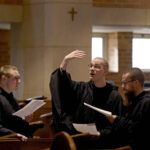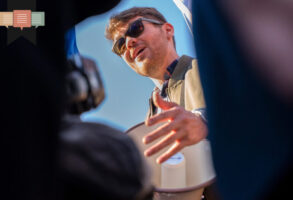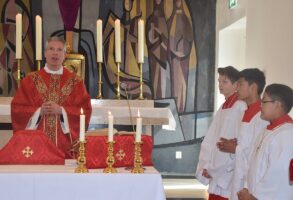December 5, 2022 | The Tikvah Podcast
On December 3, EPPC President Ryan T. Anderson joined the Tikvah Podcast at Mosaic Magazine to discuss how the Ethics and Public Policy Center tries to influence American culture and why, unlike most other D.C. think tanks, EPPC is just as interested in cultural renewal and the moral health of America as it is in policy and politics.
Jonathan Silver: The Ethics and Public Policy Center is a think tank in Washington, D.C. Over the years, it’s been the home to some of the most interesting thinkers at the intersection of religion and public affairs in America. People such as Elliot Abrams and Hillel Fradkin, Jeane Kirkpatrick, and Robby George, Wilfred McClay, George Weigel, Yuval Levin, and Eric Cohen have all been associated with EPPC over time. It’s where America’s most important journal of public policy, National Affairs, was first born and incubated, and where the most interesting journal of technology and bioethics, The New Atlantis, was first housed.
EPPC is unique in the cosmos of Washington’s think tanks, most of which, rightly, focus on policy reform, political analysis, and national security and the like. Alongside an interest in politics and policy, though, EPPC is focused on cultural renewal and the moral health of American society.
Today’s discussion begins with the question of how an institution undertakes cultural transformation. How does its leadership imagine the problem, and what is EPPC’s strategy for nourishing what ails American culture? My guest is EPPC’s new president, Ryan Anderson. I’d like for us to begin with an introduction to the Ethics and Public Policy Center. Tell us what you do and what think tanks are, in general.
Ryan Anderson: We were founded in 1976, the bicentennial year of the nation, and we’re committed to defending the moral and ethical principles that undergird the American project. We’re committed to thinking about the questions that matter most when it comes to human dignity, human identity, and human flourishing. And we think those have something to say for American culture, law, and public policy.
We’ve gone through several different iterations. When we were founded, we were mainly focused on foreign policy. In the middle of the Cold War, EPPC’s president at the time wanted to respond to the people who were claiming that the West and the “Evil Empire” were morally equivalent. In the nineties and the early part of the 2000s, EPPC turned its focus to domestic policy. When they left the White House, a bunch of people from the George W. Bush administration decamped to EPPC. Scholars like Yuval Levin, Eric Cohen, and Adam Keiper started National Affairs and The New Atlantis. Henry Olsen came a few years later. There were a bunch of people, then, who focused on domestic policy, and I think that that focus has continued.
The other thing I’ll say about EPPC—we are unique among of D.C. think tanks in that we’re explicitly religious. Unlike Heritage or AEI or Cato or Hudson, which are all on paper secular and non-religious, EPPC is explicitly religious, but we’re not confessional. We’ve had a Jewish president, a Protestant president, and Catholic presidents like myself. We have a program in Catholic Studies and a program for Evangelicals in Public Life. These different theological traditions have something to contribute to the American story. They have something to contribute to public policy, but we are also concerned with the health of the religious institutions themselves. We have scholars who advise bishops, cardinals, and in some cases popes. We have scholars here who are advising the deans of seminaries, who are advising pastors, because they need assistance in thinking through the challenges of modernity. If a thinktank is going to help a senator, congressman, governor, or mayor think through political issues, we also need a think tank to help a pastor, priest, or rabbi, think through some of these questions where they might need help with the theology, or they may not grasp matters on the cultural side.
So, we work on a variety of issues where we can bring real expertise to bear for someone in pastoral ministry who needs help understanding the latest technology, the latest phenomenon with gender ideology, or whatever the case may be.
Silver: There are some areas where the theological training and pastoral sensibilities of religious leaders intersect with contemporary challenges in American public culture and American public policy. And it’s at that intersection where the Ethics and Public Policy Center has some reservoir of a counsel that it can offer to religious leaders who want to understand how their work fits into the American story.
Anderson: I think that’s a really nice way of saying it. Also, our religious communities are wrestling with new challenges that didn’t exist a millennium, century, or in some cases even five years ago. There are things that our scholars can do to help those communities. I would add that it’s a two-way street: religious communities also have something to offer the American story. They have something to offer civil society, law, and public policy. I don’t think we want to be Rawlsians and embrace the naked public square. Our religious traditions reflect knowledge, wisdom, and truths that have bearing on questions of law and public policy.
Silver: I’m glad you brought up the explicit religious focus of EPPC’s work, because I want to draw a comparison between the work that you do and some of the other institutions in the larger movement of conservative think tanks that you mentioned. My purpose is not to praise or criticize them—many of those places produce very fine work—but it seems to me that the audience they gear their work toward is different from the readers EPPC scholars attract. So, how do normal think tanks work, and how is EPPC different?
Anderson: That’s a great question. It’s funny, because I spent a decade at Heritage and for much of that decade, people would say to me, “You’re more an EPPC-style scholar who happens to be employed at Heritage than you really are the traditional Heritage scholar.”
The main focus of a Heritage style think tank is influencing the staffers, influencing the members of Congress, educating them. I mean, they own an entire city block on Capitol Hill! So, the Heritage-style expert reads books that other people write and then translates them into 10-page white papers for staffers and congressmen who lack time to read the book. I was an outlier because while I was at Heritage I wrote four books on a variety of important social, domestic, and cultural questions.
EPPC has a slightly different model. Think about Leon Kass. I imagine our listeners will know the name. Dr. Kass was the chair of the President’s Council on Bioethics from the year 2001 until 2005. The President’s Council on Bioethics was meant to advise the president and other lawmakers on bioethical challenges. If I remember correctly, however, the very first meeting held by the Council was a discussion of a short story by Nathaniel Hawthorne—not an academic paper on narrow utilitarian bioethics. This piece of literature embodied wisdom which helped the Council to think about present bioethical challenges. Dr. Kass was holding a seminar in the public square for other scholars and religious leaders, not narrowly giving recommendations for the next vote or piece of legislation. It was meant to be a deep public education on an issue that was very, very relevant.
Dr. Kass, Eric Cohen, Yuval Levin, are all drawing both from philosophy and the Jewish intellectual tradition in a non-sectarian way. This is familiar with someone like Robbie George: he’s drawing from the Catholic natural law tradition, but again, in a non-sectarian way. To my mind, this is how I first got to know EPPC. I was in college during the early days of the Bush Bioethics Council and embryo destructive research and cloning were major topics of debate. We sometimes forget how important in the early 2000s bioethics were. As I was reading this stuff, I didn’t think, “Well, I’m Catholic, so I can’t learn from someone who’s appealing to a Jewish authority, a Jewish source.” The Council’s arguments were framed as ancient wisdom that we can apply to modern, technological, bioethical questions. Its work was ecumenical and interfaith in the best sense. I now hope to go forward saying, “We can nurture and learn from the Jewish, Catholic, and evangelical communities, but we can also think about important questions in the public square.”
Silver: Let me put to you a challenge. I want to say I do not take the view that I’m about to articulate. I want to put it on the table and then just hear how you respond to it, because it’s something that in our work also at Tikvah, is something we wrestle with, too, from time to time. Look around—this country that both of us love is not in great shape. There’s all kinds of serious, urgent things that could put us in a really bad place not just in terms of policy, but national security. And you guys want to go read Nathaniel Hawthorne? Listen, if you want to just have a book club, that’s fine. Go have a book club. However, what we need at this moment are people who are engaged in politics. Politics is about action, and action requires somebody to think out what needs to be done. So, insofar as there is thinking related to politics, it should be oriented toward the doing.
Anderson: Let me give a concrete example in response. President Bush issued an executive order prohibiting federal funding from going to any future embryo destructive research. There were four stem cell lines that were already in existence. He said, ‘you can use the ones where the lethal action has already taken place, but there will be no federal funding for future embryo destruction.’ And then, his own Republican-controlled Congress twice passed a bill to fund embryo destructive research and he vetoed it twice. People like Leon Kass and Robbie George and George Weigel and Mary Ann Glendon had persuaded him of the truth, the moral truth of the position that he advocated for. Yes, he was a man of action, but he needed the expertise of the scholars who had been reading Nathaniel Hawthorne along with the rest of classical humanist learning to then explain to the president why his actions were in the cause of justice, the common good, and human rights—and then he took action. I don’t think these things can be separated.
Another example of this is the essay by CS Lewis entitled “Learning in Wartime.” When someone asks, “it’s the middle of World War II. Why are we still going to Oxford and Cambridge for all this book learning? We need to win the war.” Lewis essentially replies that we’re always on the verge of dying. The war just helps bring it to the fore. When you phrased your question you said, “if x happens, then things could get really bad.” Look, things already are really bad. I don’t even think we need to phrase it in a conditional. Things in the United States are not good for our laws, our political parties, our culture, or our religious communities. We need to think deeply in order to accurately diagnose the nature of the problem before we prescribe its solution. So, I think we aren’t just pointy-headed academics who are enjoying their book club, for we make a critical real-world difference. To my mind, it actually signals vitality on the right side of the aisle that right now we have so many political disagreements because we’re not just going by rote memorization and repetition of the 1980s talking points. We’re actually thinking through the nature of 2022’s challenges and their potential solutions. And those aren’t ready made—you can’t pull out your kind of pocket guide to today’s issues.
Silver: Ryan, I want to try to put to you a kind of tacit assumption about the way influence works in a democracy that I think is undergirds EPPC’s strategy. I want to try to articulate it, ask you to first tell me if I’m right or wrong, and then tell me how you go about it and approach it.
In a democracy, of course elected officials have their perspective, but they’re elected by people who agree with them to some extent. Thus, the moral sensibilities of the people are the things that are most in need of education. And the people themselves are primarily influenced by the institutions of civil society, not their representatives. Therefore, the audience EPPC addresses are those institutions most in need of moral renewal: families, congregations of various religious kinds. In some sense, the audience of the typical think tank is maybe more politically immediate, but it is epiphenomenal on the deeper source of America’s attitudes about things, which are the people themselves. It’s not that you’re not interested in politics, but you think this deeper leverage point, which you uniquely focus on, is what’s most needed and unattended to by the other institutions.
Anderson: I think I fully agree with that, with one caveat, which is to say that I think Aristotle is entirely correct when he emphasizes the pedagogical nature of law. And so, it’s a symbiotic relationship of the moral health of our institutions of civil society and the demands that the electorate place upon elected officials actually move the needle politically speaking.
What those political leaders, both legislative, executive and judicial branch do in turns shapes our institutions. You’re seeing this play out in real time with the Obergefell decision. After the Supreme Court redefined marriage—I mean as we’re recording this—there are various religious groups who are supporting a vote in the Senate that would codify Obergefell. Some have very clearly drifted on their underlying theological convictions. You also see this in the public opinion polling. Since Obergefell, the average person in the pews has drifted on this. So it’s important to see that there is a dual reason to care about the law. The law, whether it’s about abortion or gay marriage or whatever, is going to actually directly promote justice or injustice, promote the common good or hurt the common good. Also, it’s going to have this additional pedagogical function of then changing the beliefs and the morays of citizens who live under that law. And so, if you have the Supreme Court for 50 years tell you that you have a constitutional right to abortion throughout all nine months of pregnancy, more people are going to come to believe it—it’s symbiotic.
But I think you’re exactly right in saying that of the various kind of D.C. think tanks, we place much more of a focus on not just educating the lawmakers, but also working with the leaders of civil society. We have programs that are geared to Catholic leaders and evangelical leaders, we spend a lot of time working with K–12, university, and law school educators shaping the people who then in turn shape families, religious communities, institutions of higher learning, et cetera.
That is where you’re going to see a long-term generational change take place, which in turn will then shape the law and the politics. I hated when Andrew Breitbart said, “Law is downstream from culture.” That’s a half-truth. It is, right? It’s downstream from culture, so culture’s going to shape our law, but the image that I always liked was an image of a tide that goes in and goes out where the tide shapes the seashore. The sea shore, in turn, shapes the ocean. If you have a bunch of litter on the seashore, they’re going to take it out to sea.
And so, it’s symbiotic. It’s mutually either reinforcing for good or for ill. I think some conservatives can focus too much on the culture to the exclusion of law and politics and some conservatives are prone to focus too much on law and politics to the exclusion of the culture. Aristotle says, “Virtue is the mean between two extremes.” And so, we’re aiming for that sweet spot where we give due attention to both in the right way at the right time.
Silver: It brings up a really interesting question, and I think your point about the educative function of the law is really important. It leads me to ask you this, to what extent would you say that right now, different confessions of American Christianity are more influenced by trends in democratic politics—by democratic I don’t mean in a partisan way—than they themselves influence American democracy. In other words, would you say that that America is more influenced by Christianity or Christianity is more influenced by America?
Anderson: If I had to say, as a whole it’s the latter. Christianity is being much more influenced by America. And by America, I mean Hollywood, I mean politics, I mean business. Look at how many people check the box that they identify as Christians. But then, when you drill down deeper and you look at how many of those people actually belong to a church and how many of those people actually go to church at least once a month? They’re supposed to go every week. And when you drill down deeper and deeper into how many people are actually going to their house of worship at least once a week, it’s a fraction of a fraction of a fraction. So, I think that cultural Christianity we’ve always had, where Christian beliefs were just in the atmosphere and you picked them up by osmosis, is no longer there. Our culture has always shaped religious communities and vice versa. But at some point we had a vestigial Christian culture that was still reinforcing actual Christian houses of worship. Now, we have a very secular culture, and I think many people, even if they technically are check the box Christians, they’re much more influenced by Hollywood, by law, politics, by business, because they spend more time stewing in it. Let’s say you’re going to church one hour a week, one day a week, but you’re doing nothing else, you’re not reading the Bible, you’re not praying, you’re not in a devotional group, you’re not in a small group, then that means let’s assume you’re awake for 16 hours a day, seven days a week. That means one hour compared to 111 hours where you’re being shaped by the culture. Your smartphone, Twitter, cable news, Hollywood movies, TV shows, music—none of those things any longer have a vestigial Judeo-Christian ethos about them.
Silver: I want to just now press this one level more. You’re right to say that the average experience of the sort of American you’re describing who has not written off religious devotion altogether, who does go to some house of worship but goes infrequently and goes casually, is already a very small minority of the country. But now, if we push this one level beyond, we have reason to worry that the messages that they’re receiving while sitting in that congregational setting are themselves as influenced by the culture as they are by the inheritance that it’s the responsibility of the pastor to transmit. And here we get to what New York Times writer Ross Douthat refers to as an American heresy. It’s not that Americans are markedly less religious, it’s that the sort of religious message that they’re receiving is bad religion. This is another place for EPPC to try to analyze the culture. But is this where you’re trying to pitch your resources?
Anderson: There, but not exclusively there. And just to bring listeners up to speed, Ross Douthat had a book called The Decadent Society. He opens the book with what religion in America looked like in the 1950s and what it looks like today. And there’s much more of moralistic therapeutic deism now, that there is a god up in the sky, but he’s a therapeutic God. He just wants me to be happy. He’s my therapist. He’s a deistic God. He’s not a providential God, so it’s more like it’s a guy who wound up the clock and now he’s up there. And then, moralistic in the sense of not the virtues, not a historic understanding of what are the dispositions, the character traits, but moralistic judgments. This moralism is, ‘mean people suck. God just wants us to be nice and don’t judge other people.’ Douthat plays on this in the book with saying, “That’s actually the substantive theology of a lot of people in the pews and that’s a problem.” That’s a focus of ours, but it’s not our exclusive focus because remember, our full title is the Ethics and Public Policy Center. A deeper challenge for us is asking, since this is the citizenry we have, how do we still try to advance public policy that’ll uphold human dignity? The common good, human flourishing admits those challenges, so, being sensitive to those very real kinds of demographic challenges that we face, how do we nonetheless try to strengthen the family, the right to life, and religious liberty?
Because you can’t be blasé. Maybe in the 1970s, 1980s you could take for granted that the culture was with you. Today, it’s more of a cultural mixed bag. I don’t think the culture’s with us when it comes to Bruce Jenner becoming Caitlin Jenner. The American culture is one of, “Look, he’s an adult. It’s live and let live. If Bruce wants to be Caitlin, it’s no skin off my back,” et cetera, et cetera. However, I do think the American culture is more or less with us when it comes to gender ideology and children. Not because they’re Bible believing Jews and Christians, but just because they have some remaining common sense, they think it’s bad to perform a double mastectomy on a thirteen-year-old girl. They think it’s bad to give a nine-year-old boy puberty-blocking drugs. And so then, the question is how do we take that and try to nudge those people in a better direction and help them see they’re actually deeper reasons for why they should be concerned about this. I’m reminded of an old Leon Kass phrase, “the wisdom of repugnance.” We can actually trust some of our gut intuitions and instincts when it comes to these moral matters. But then, we have to connect the initial wisdom of repugnance to a deeper wisdom tradition. Whether that’s a theological tradition or a philosophical tradition, that takes real work. That doesn’t just happen automatically.
Silver: Now, Ryan, let’s get a little more practical. The mission is cultural renewal. We’ve talked about how you’ve sort of segmented the audience for that message. How do you do that?
Anderson: If you’re going to be a think tank, as opposed to a political action committee or a lobbyist group, you have to have good scholars as a starting point. Everything that will follow depends on the quality of your scholarship. From there, you have to then develop actual issue expertise whether you’re talking about technology policy or family policy or judicial philosophy. Some people’s issue expertise explores our worldview. One of the fellows at EPPC is Carl Trueman. Carl’s not an expert on a given area of public policy. His expertise is intellectual history. He set out to write a book to explain why so many college students today think that the phrase, “I’m a man trapped in a woman’s body,” is not only intelligible but believable, whereas every one of my grandparents would’ve thought that that was an in incoherent idea. What took place within two generations that one set of people respond to that by saying it’s unintelligible, it’s laughable, it’s nonsensical, and the other says it’s a human rights issue? Carl’s expertise is giving us a 400-year genealogy of all the various intellectual and cultural and artistic moves that got us here. That’s real scholarship. That’s real expertise. Other people’s expertise might be more discrete. Let’s say there’s a regulation that the Biden administration is promulgating and it’s going to have huge implications for how we practice medicine, for how we conduct education, and then ultimately for religious liberty. We’re going to read through hundreds of pages of federal code to explain how all of this tinkering will then have bottom-line outcomes. Both are types of expertise, and we have EPPC scholars who have both. It starts by actually having legit scholarship, issue expertise, and that could be a worldview thing or a policy detail.
Everything else flows from that. Your communications department, your government relations department, your coalitions department, it’s all at the service of advancing the scholarship. Legislatively, that can look like idea promotion—working with a newly elected senator and his staff to develop new policy proposals. Sometimes, it’s judicial. A lot of the work that I’ve done has actually been working with litigators to better understand the structure of the debates that they’re litigating on. Whether it’s been litigation on marriage, litigation on religious liberty, litigation on anti-discrimination statutes, the wrong framing of an issue could actually be the death knell for your litigation strategy. For example, if you buy your opposition’s framing that they’re in favor of marriage equality, you’re against marriage equality. Well look, we’re all in favor of marriage equality. It’s not that we disagree about freedom or disagree about equality, it’s that we disagree with the underlying ontological institution of what a marriage is. And then, that changes how you might approach 14th Amendment questions of equal protection of the law. Sometimes we work with the executive branch. I have friends who served in the Trump administration, I was still at Heritage at the time, and we were having conversations about what a good executive order or regulation would look like. In the same way that now we can analyze and file comments criticizing bad regulations coming out of the Biden administration, with a future administration that’s conservative, we might be working with them and then praising what they come up with.
The next step is shaping opinion and winning in the public square. Going on TV to talk about this stuff or writing an op-ed in the short-term. Writing a book that’s going to go on college syllabi to influence the thinking of the next generation of leaders in the long-term. And then, there’s all the lobbying stuff. We don’t have a C4 or a PAC or a 520, we don’t have any of those, but other think tanks do. They have sister organizations where they’re a C3 and their C4s can do more lobbying, and PACs can engage in electioneering. In any case, it all should flow from the underlying scholarship, from the underlying truth proposition. Everything else should be structured to advance your vision of what justice, human dignity, the common good are.
Silver: How do you know if you’re succeeding? For other institutions in Washington like yours, their focus is, “I want to influence legislation, so I’m mapping out the legislative calendar of the incoming Congress and these are the five things we want to influence.” It seems to me that though this approach is more practical and shorter-term, it is clearer—you have the ability to put on a scorecard the success or failure of an institution like that. But for an institution whose purpose is moral renewal alongside public policy, it’s a little harder to know.
Anderson: It’s more qualitative than it is quantitative. We don’t measure our success by amount of op-eds or testimony before Congress. Lots of op-eds are full of lousy logic, and they are placed in good publications as the mouthpiece for the agreed-upon narrative rather than challenging that narrative to see a deeper truth. So, it’s not a one-to-one correspondence.
I evaluate fellows at EPPC by looking at the actual quality of their research, whether it was published in places that move the needle, if it will garner an audience that matters, and if the scholar worked hard to promote it. For example, it’s great if you write a book, but. We can come up with all the best ideas in the world, but if its pages aren’t turned by the right hands, ultimately it’s useless.
For an EPPC scholar, I look for people who are courageous, persuasive, intelligent—I care about how they go about influencing policy. All these things matter because if you’re uncharitable and a bomb thrower, then you’re not persuasive and that’s not helpful. If you’re a coward and unwilling to bear witness to truths that are controversial, you’re not helping. And then lastly—it’s a think tank! You must be on top of the intellectual game for your area of expertise. You need to do the work. And that’s all more qualitative. I can’t give a metric to someone to explain those things, but when you’re then operating with someone who deeply understands a particular policy area, they know it when they see it. I had a conversation just recently where someone told me, “every time I’m looking for a resource on issues that I care about, I’m finding myself concluding that the best stuff out there is being produced by your scholars.” He doesn’t have a metric for the best stuff out there, either, but he knows that when he’s looking for something to send to a colleague at work or to send to one of his kids, he’s going to our website and he is finding the essays, the articles, the op-eds, the books that he thinks best articulate the viewpoints that he’s trying to advance with his family, his friends, his circle of influence.
Silver: We’ve spoken, Ryan, about the influence that EPPC aims to have with legislators and with leaders in civil society. We’ve spoken about the influence of democratic politics and democratic culture in religious traditions in America. I want to conclude our conversation by asking about the special obligations, responsibilities, opportunities that you think religious Americans have to bring to the American public square at this moment.
Anderson: We could do the whole podcast on that one question. I think religious believers today are the inheritors of the old wisdom that needs to be applied to so many of the challenges confronting us today. You’re not going to get it from most of the mainstream universities, right? Because they’ve given up on long traditions of rationality. That’s just the character of contemporary thought. It’s John Rawls, John Stuart Mill, utilitarianism, or Kantianism—that’s the debate. They’re leaving out the entire tradition of virtue ethics, natural law, theological ethics. In many universities, you can’t even get that taught any longer. It has been the religious institutions that have kept alive those traditions of rationality. Because of this, religious Americans have the potential to be, according to a great lecture by Rabbi Sacks, creative minorities. He said, “you can be the salt and the leaven,” meaning that you can engage in cultural reform by reminding people of deep truths that resonate and appealing to the law written on the heart, to use St. Paul’s language in his Letter to the Romans. At the end of the day, the moral values that true religion bears witness to aren’t arbitrary commands from a capricious, dictator God. This might be a common area between Catholicism and Judaism here. When God creates us, He creates us with certain natures such that certain things are naturally good or bad for us. So, the law that is given at Mount Sinai corresponds to the natures that we are created with. When a religious believer bears witness to those truths and applies those truths to contemporary challenges, there will be a certain resonance intimating that this is actually fulfilling, this is actually good for me. So that’s part one.
The second thing is even more important. Ultimately, our final happiness, our final telos, is not just temporary. Obviously, our theological traditions have different ways of expressing this, but we agree that religious communities ultimately exist for friendship, relationship with God. It follow that the deepest thing America’s religious communities have to offer to contemporary America goes beyond public policy and moral renewal. This was always the challenge for the first-generation Neocon thinkers. They liked the secondary benefits of religion in civil society, but many of them weren’t all that religious themselves. It’s a challenge, because I think society only merits these long-lasting social, cultural, political benefits if there are actually true believers. And, crucially, true belief is where we find our final, ultimate happiness. The contribution of religion to America is irreplaceable because all of human nature is, ultimately, oriented to religion. Being authentically religious is, in this way, the most important contribution that religious communities in America can make. Don’t just be the New York Times at prayer. Actually embody and live out religious practices, traditions, liturgies, et cetera, and bear witness to religious truths.
Silver: Here’s where the metaphor of the tides that you introduced us to earlier comes back into play. Of course, the right ordering of the human soul in relation to God and itself is the deepest purpose of our various religious traditions. Nevertheless, we have an obligation to care about the health of this society. First of all, it’s the soil in which we are planted, in which we are trusting to some extent to help us raise our children. And second, there are elements in society that can enhance and hinder our religious experience. We have to make sure that other Americans can enjoy as we enjoy the ability to live out Judaism and Christianity as completely and faithfully as we can. Ryan, thank you for joining us.
Anderson: Thank you. This was great. We should chat more often. I enjoyed the conversation.








